Dove: The Adventures of Pinocchio
Introduction
Pinocchio first saw life, as it were, in a serialisation of an allegorical story by Carlo Lorenzini in the early 1880s. He is better known as Carlo Collodi (a pen name, taken from his home town in Tuscany).
The original serialisation was a work of dark, moral lessons in fifteen chapters, at the end of which, Pinocchio was left hanging from a tree in a forest. This was a little too gruesome an ending for some, including Collodi's editor, and so he was persuaded to write 21 more chapters, and the whole work was turned into a novel in 1883.
Since then, the story has gone through several adaptations, with the Disney 1940 film being, arguably, the most famous.
The opera by Jonathan Dove, is the latest of these versions, and thankfully restores much of the original feeling and realism (as far you can in a story such as this) which Disney stripped away, leaving the famous, but utterly sanitised and overly-saccaharine film we all know.
Here, we have around 20 of the original chapters, chosen by Dove and the librettist Alasdair Middleton, inluding the hanging scene, the cricket's death (oh yes, if Disney had done it correctly, ol' Jiminy would have been squashed in the first ten minutes), and a brilliant trip to Funland, where all the lazy boys turn into donkeys....not to mention the obligatory trip into the stomach of a rather large fish.
Video
Very successful NTSC, which captures the immediacy of the live theatrical experience. There is no problem at all in any of the darker scenes (of which there are many)
Audio
With whats seems to be a huge orchestra in the pit, the balance issues are brilliantly coped with here. There is no need to use the English subtitle option (as I have had to do a few times, even with English language tracks), due to the excellent recording, and also the fantastic diction from all on stage.
Extras
The main extras consist of four interesting 'chats' with the composer, librettist, conductor and director, two on each disc. In these, we discover quite a bit about the thoughts behind the production, and the issues raised when putting it all together. There is some repetition from all about what the show is all about, but this is probably to be expected. If anything I would have liked to have heard from some of the singers involved as well, and hopefully seen some 'behind the scenes' work, but there is none there to be seen.
Conclusion
A new contemporary opera is always going to find trouble getting a wide audience outside the usual 'cognoscenti' of students, critics, other composers and those who 'just want to be seen' frequenting these performances.
It's surprising that it has taken so long for the development of a major musical theatre piece on this subject, but it is certainly worth the wait.
Dove's music is instantly approachable, for the most part, yet stylistically, very difficult to pin down. There are certainly many elements of Britten (vocal lines, especially for Lampwick's character), Bernstein in the more jazzy moments, various amounts of Stravinsky, Ravel and West Coast minimalism all over the place...yet it all fits together very well indeed. The major characters get a little 'leitmotif' treatment, helping us all gain a little more familiarity with Dove's soundworld, and the use of the orchestra is fantastic....although anyone sitting around the piccolo would have come out of there with a bleeding eardrum or two.
Middleton's libretto is very entertaining, containing some obvious 'fairy tale' aspects of repetition (also used frequently in Baroque operas) and rhyme, a very clever 'patter song' from the Ringmaster, and frequent use of catchy animal-mimicry. There is also, thankfully, no attempt at trying to explain the obvious inconsistencies in Collodi's own narrative. As Middleton says himself, these things happened 'because I said so'. Children are able to accept this, and so should we.
Its amazing what children can put up with to be honest. From all accounts, they could put up with the length of this work more than their older companions, and could cope better with some of the darker aspects of the piece, while the grown ups probably wondered whether their little darlings would be scarred for life.
Much of the success of this production comes down to the production itself. This is what I would term real theatre. Maybe it's a little down to budget constraints, and maybe a little to do with the fact that scene changes had to be quick and efficient, and everything needed to be fitted into various theatres around the country, but you can almost smell the hard work that's gone into this. Any effects you see are down to the ingenuity of the designers, and even when the 'effects' consist of puppeteers on stage manipulating large objects, the sense of wonder isn't lost. Admittedly, it's easier to miss mushc of the on-stage extras when the DVD focusses on what we should be seeing, but I'm not sure this detracts from the 'live' experience.
And then there's the singing.
This is an opera which was wirttten specifically for the singers you see on this disc. The tradition of writing for certain singers goes back centuries, but it's unusual to get a record of the 'original' cast in full flow, and at their best too. David Parry chose Victoria Simmonds for the title role, and it was a wise choice too, even before he had heard a note of the music.
Simmonds takes on the incredibly physical role with apparent ease, being covered with padding, and communicating with all, on and off stage with great charm, and her vocal technique is perfect for the 'spoilt brat' moments, as well as those where tenderness and lyricism are the only option.
In fact, everyone involved (some of the roles are taken by chorus members) is required to be quite active, apart from perhaps Carole Wilson when she is the snail, and special mention must be made of Graeme Broadbent, who takes on four roles, including the spectacular, and sadistic, Ringmaster.
James Laing's performances as the fox and coachman (sounds like a pub there) are fantastic, his strong counter-tenor voice carrying over some heavy orchestration, and the teamwork between him and the slimy Mark Wilde as the cat is hilarious.
There are some very beautiful and moving sections dotted throughout the work, most notably being Lampwick's (Allan Clayton) constant yearning for a land where a boy never needs to work, or learn. It appears again at the end, just before his death.
This true ensemble piece deserves more and more outings. It has just had its US premiere in Minnesota, but will always remain the 'property' of Opera North, and this DVD is a perfect record of a great performance from a great company.
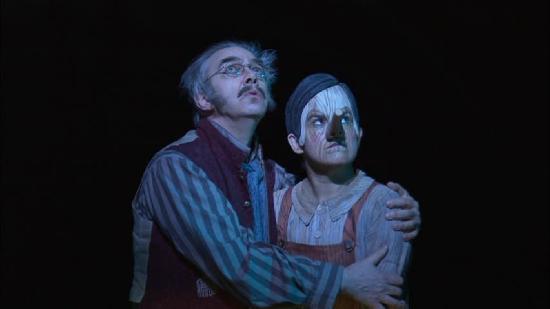
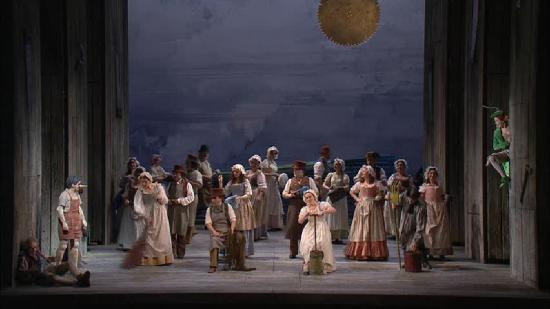
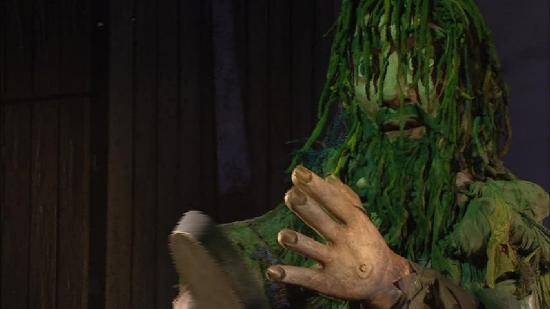
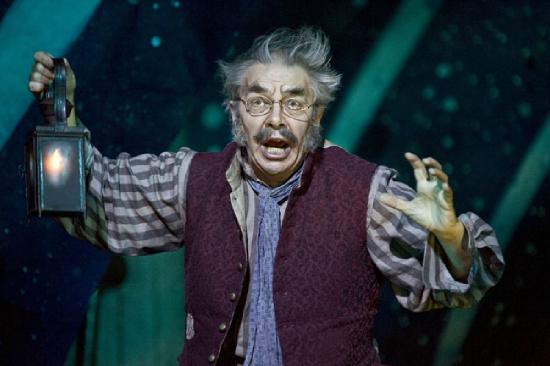
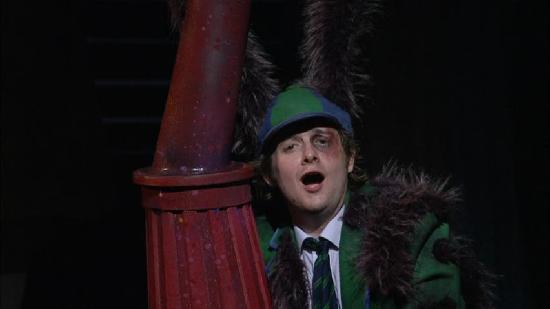
Your Opinions and Comments
Be the first to post a comment!